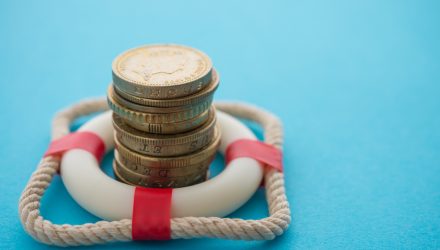Debate lingers about the recession status of the U.S. economy, but investors looking to prepare for the first while still maintaining leverage to equity market upside have some compelling options.
One of those options is dividend stocks and exchange traded funds, including the SmartETFs Dividend Builder ETF (DIVS). An actively managed ETF with a focus on quality, DIVS could be an ideal equity destination for investors should a traditional recession arrive.
“Investors concerned about an economic slowdown may want to consider adding a stake in dividend-stock funds, which have historically held up relatively well during recessionary periods,” noted Morningstar analyst Amy Arnott.
As an actively managed fund, DIVS can more nimbly make sector bets that are more appropriate for recessions. On that note, it’s worth noting that while high-dividend stocks are outperforming this year and DIVS is more of a payout growth strategy, some companies with big payouts can be strained during recessions, prompting dividend cuts and suspensions.
Obviously, income investors want to avoid those negative actions. That’s in any economic environment, but those concerns are amplified in a recession. After all, one of the primary selling points of dividend stocks is lower volatility, but that favorable trait is jeopardized when payouts are cut.
“Stocks that pay above-average dividends are often thought of as safe havens during periods of economic uncertainty,” added Arnott. “Companies that generate cash can use this excess cash in three different ways, broadly speaking. They can reinvest in their business, use it to acquire or invest in other companies, or return it to shareholders in the form of buybacks and/or dividends. Companies that start paying dividends typically have enough excess cash flow to continue making payments year after year.”
DIVS, which yields almost 2% and holds 35 stocks, has the defensive and quality traits that can help investors survive and thrive during economic contractions. For example, healthcare and consumer staples stocks combine for almost 30% of the fund’s roster. Moreover, those are two of most desirable sectors for investors seeking reliable payout growth.
Additionally, history is on the side of DIVS when it comes to dealing with recessions, and that’s a relevant near-term consideration for market participants.
“Dividend-paying stocks fared better than the market overall in the economic slowdowns that started in July 1981, March 2001, and December 2007. What’s more, they did so by significant margins in two out of these three periods,” concluded Arnott.
For more news, information, and strategy, visit the Dividend Channel.
The opinions and forecasts expressed herein are solely those of Tom Lydon, and may not actually come to pass. Information on this site should not be used or construed as an offer to sell, a solicitation of an offer to buy, or a recommendation for any product.

